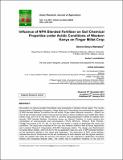| dc.description.abstract | Soil acidity is a serious problem that affects crop productivity in Western Kenya region. The county
governments of Kakamega, Bungoma, Vihiga, Busia and Trans-Nzoia are promoting the application
of NPK blended fertilizer to enhance the soil acidity. Finger millet (Eleusine coracana L. (Gaertn) is
one of the principal cereal crops in Kenya and can grow in stress conditions much better than other
cereal crops, and it is for this reason that it is currently being popularized in efforts to address food
security. NPK blended fertilizer, Commonly known as ‘Mavuno Fertilizer’ to locals contains the
combination of macronutrients and micronutrients (10%N, 26%P2O5, 10%K2O, 4%S, 8%CaO,
4%MgO and traces of B, Zn, Mo, Cu and Mn) that makes it unique to ameliorate this acidic soil
conditions. The study was conducted at the crop and livestock research field at Kenya Agricultural
and Livestock Research Organization (KALRO) Kakamega station. The design was Randomized
Complete Block Design, with 0,25,50,75,100 kg application rates per acre of NPK blended fertilizer
as the treatments applied in two equal split application. The application of NPK mixed fertilizer
reduced the amount of aluminium in the soil consistently for both seasons with the highest reduction
under the highest rate while the soil pH, soil calcium and soil magnesium significantly increased
linearly with increasing fertilizer rates. The control had no significant influence on the soil pH compared to the treated plots as compared to the analytical results of the soil pH of 5.71-5.73 before
planting. The soil aluminium content drastically reduced from 2.10 cmol/kg in control to 1.4 cmol/kg
in the 100 kg/acre in both rain seasons under the local variety Gulu-E with slight differences from P-
224. The highest application rate of 100 kg/acre significantly increased the soil calcium contents to
3.4% and 3.3% during the short and long rainy seasons respectively. The NPK blended fertilizer
application from any rate can positively ameliorate the soils in western Kenya by reducing the
acidity | en_US |

